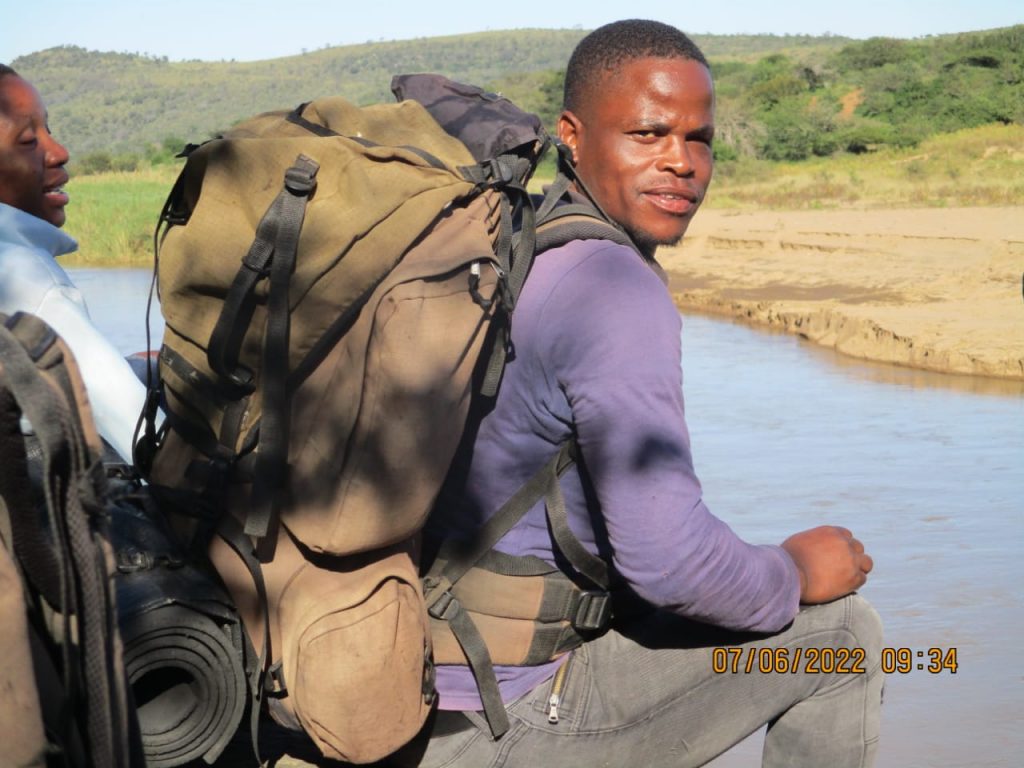
Recently Wildlife ACT, in collaboration with the Wilderness Leadership School, led two groups of Conservation Ambassadors through a Wilderness Trail in Hluhluwe-iMfolozi Park.
The Conservation Ambassadors travelled from various communities around Zululand to come together and learn more about South African wildlife and nature conservation, as part of Wildlife ACT’s Community Conservation Programme (CCP).

The CCP works at the interface between protected areas and local communities, aiming to strengthen relationships between the two, and develop an understanding of natural heritage and encourage community stewardship.
“South Africa is an extremely diverse country boasting high levels of wildlife and biodiversity. Unfortunately it also has one of the biggest discrepancies between rich and poor – globally,” says Wildlife ACT’s Managing Director, Mark Gerrard.
“This diversity is especially true in KwaZulu-Natal – a province with the second highest population in the country, with many people living in poverty and adjacent to world-famous wildlife game reserves.
Historically these communities have been excluded from wildlife reserves. This trend continues today, with few opportunities for individuals to become involved in conservation initiatives and the wildlife economy.”

Wildlife ACT’s CCP aims to address these exclusions head-on through creating learning and access opportunities for our Conservation Ambassadors.

We hope you’ll enjoy reading from of the feedback our Conservation Ambassadors have provided on the Wilderness Trail:
“On the first day of the trail I felt afraid but on the second day I felt confident and happy. The walking trail at Hluhluwe-iMfolozi Park gave me more instructions to follow for when you’re in the bush and I gained more experience and confidence. I learnt how to respect animals and our Tour Guides were very responsible and friendly with us. I would recommend that everyone should visit Hluhluwe-iMfolozi Park so that they can feel excited, comfortable, and learning more about the animals.” – Muzikayise Dlamini
“I learnt more information about nature conservation through this experience. Today I know the difference between Black Rhino and White Rhinos. The Black Rhino eat leaves and branches especially from thorn trees and their waste is a mixture of grass an thorns, which makes it rough. The waste of White Rhino is softer because they eat grass. We also learnt about the stars in the sky and what they symbolise. We found out that you can use the stars to help tell the time.” – Nomzamo Gumede
“I learnt what it’s like to work on a game reserve and about the animals in the bush.“ – Jabulile Mafuleka

“I learnt that Black Rhinos eat leaves and twigs – it is a browser. And that White Rhino eat grass – it is a grazer. I also learnt that a Rhino will always do it droppings in the same place. This toilet is called a territory or midden and you can sometimes see it on the side of the road.” – Gugu Mafuleka
“I’ve learnt and gained a lot from the experience, like the behaviour of different animals, about how they depends on each other in an ecosystem, and how they communicate. Also I learned communication skills. Socialising with people I never met before was hard for me, but after that trail I think I’ve gained that skill. Being away from my comfort zone, with the good sounds of birds, Lions, Elephants and other animals at night was so interesting. In a trail you get to find yourself, like the achievements I want in life, that quietness and peace of mind. I had a good experience and I’m hoping to gain more through Wildlife ACT.” – Bhekokwakhe Ntshangase

“When I was at Hluhluwe-iMfolozi Park, I learnt that there’s a different between Black Rhinos and White Rhino. The Black Rhino has a hooked lip while the White Rhino has a square lip, because Black Rhino browse instead of graze and the hooked lip helps them to munch on leaves from trees and bushes.” – Mbali Hlatshwayo
“Involving myself in a trail was scary at first, but at the end of the day I enjoyed the trail. I learnt a lot of things about the animal in the Park and shared some views with other people. I learnt about the behaviour of different animals and how to deal with different situations. I also learnt to communicate with other people I’d never met before which was hard for me because I’m shy. Being away from my comfort zone and listening all sounds of animals at night was so interesting.” – Khethiwe Mdluli
“The trail helped me to get a good understanding about wild animals behaviour and how you should react when you come across them. I met new people and built some new friendship. We shared some ideas and life experiences and talked about how to build the future. I got time to think about myself and what I really want in life and what I need to do to improve and shape my life.” – Nokthula Mkwanazi


“At first, I was nervous because there are wild animals in the reserve, but it was a good experience. I got to meet different people from different places, share opinions and views, and communicate with others.” – Nontobeko Dube
“I decided to join the trail in Hluhluwe-iMfolozi Park because I wanted to fuel my soul, my mind, heart and spirit with new ideas. Being around the nature where the noise pollution has no place was the best. We had enough time to think about ourselves and the importance of nature.” – Lindani Sboniso Nkosi
Support our Conservation Ambassadors and Community Conservation Programme HERE.
The post Wildlife ACT Conservation Ambassadors participate in Wilderness Trail in Hluhluwe-iMfolozi Park appeared first on Wildlife ACT.

